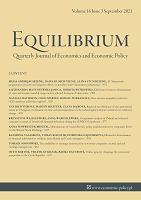Catering to investor sentiment for dividends: contestability or collusion of the largest shareholders?
Catering to investor sentiment for dividends: contestability or collusion of the largest shareholders?
Author(s): Aleksandra Pieloch-BabiarzSubject(s): Economy, Financial Markets, Socio-Economic Research
Published by: Instytut Badań Gospodarczych
Keywords: dividend payout; the catering effect of dividends; contestability & collusion of the largest shareholders; investor sentiment for dividends;
Summary/Abstract: Research background: Dividend payouts have been the subject of scientific research for many years. Although many studies focus on the impact of ownership on dividend payouts, there is still a lack of research on the influence of the contestability and collusion of the largest shareholders on the catering effect of dividends. This research gap motivated us to investigate this issue and determine whether the interactions between large shareholders have an impact on aligning dividends with investor sentiment. Purpose of the article: The article assesses the impact of the relationship between the largest shareholders (i.e., contestability or collusion) on the adjustment of dividend payouts to investor sentiment. The following research hypothesis has been formulated: If there is contestability between the first and second-largest shareholders, the strength of the catering effect of the dividend is greater than in the case of collusion, both in the years of positive and negative dividend premiums. Methods: The main research method is a panel regression model (pooled OLS and fixed effects). We use the F test, the Breusch-Pagan test, and the Hausman test. Our research is supplemented with descriptive statistics and the Pearson correlation coefficient. The research sample consists of Polish companies from the electromechanical industry sector listed on the main market of the Warsaw Stock Exchange (WSE) in the years 2009?2020. Findings & value added: The main findings are as follows: a) if a dividend premium is positive and the second-largest shareholder holds many shares, the strong catering effect of dividends is observed; b) there are only two years of negative premium, which does not allow to conclude that both the catering effect and the impact of interactions between the largest shareholders on dividend payouts do not exist when dividend premium is negative. We propose pioneering research concerning the catering effect in the context of interactions between the largest shareholders. Its long-term theoretical value added is the original and interdisciplinary research combining financial, behavioral and governance aspects. Our research results may be of particular interest to foreign investors looking for new opportunities to invest their capital abroad, also in Poland.
Journal: Equilibrium. Quarterly Journal of Economics and Economic Policy
- Issue Year: 17/2022
- Issue No: 2
- Page Range: 435-457
- Page Count: 23
- Language: English

